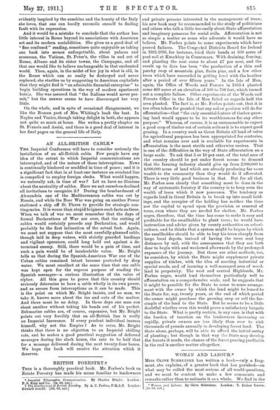BRITISH VORESTRYI' THIS is a thoroughly practical book. Mr. Porbes's
book on Estate Forestry has Made his name familiar to landowners
.*,Imperial Telegraphic Communication. HY Charles Bright. London ; P.,& 'King and CO. tae. 6d. net.]. ;a1 'ACE' heaBIL,
t
The Daveropmeit Of British Porra. By A. , A.S. Loadon: Ethiard Arnold. RN. ed, nst.1 and private persons interested in the management of trees ; his new book may be recommended to the study of politicians and others who talk a little too easily about State afforestation and imaginary panaceas for social evils. Afforestation is not so simple a matter as some who advocate it would have us believe. Mr. Forbes points to some experiments which have proved failures. The Congested Districts Board for Ireland in 1892.1896, for instance, tried their hands at 500 acres of peat soil at Knockboy in Connemara. With draining, fencing, and planting the cost came to about £7 per acre, and the result up to date has been " the production of a thin and patchy crop of mountain pine, Scots pine, and a few other trees which have succeeded in getting level with the heather after a period of over• fifteen years." In the Isle of Man, again, the Office of Woods and Forests in 1883-4 planted some 400 acres at an elevation of 500 to 700 feet, which turned out a complete failure. Other experiments of the Woods and Forests Office in the Isle of Man failed as regards half the area planted. The fact is, as Mr. Forbes points out, that it is too often taken for granted that any soil or position will do for afforestation—that " the only essential feature of timber-grow- ing land would appear to be its worthlessness for any other purpose." Whereas, of course, it is as unreasonable to expect a good crop of timber out of certain soils as it is to expect good grazing. In a country such as Great Britain all land of value for agricultural purposes has been appropriated for centuries, and what remains over and is available for experiments in afforestation is the most sterile and otherwise useless. That is one of the difficulties in the way of State afforestation on a large scale. To ask that 5 or 10 per cent. of the total area of the country should be put under forest means to demand that the farming industry should give up from 2,000,000 to 4,000,000 acres of land which are already producing far more wealth to the community than they would do if afforested. There is very little good business in that. But for all that, Mr. Forbes sees clearly that something must be done in the way of systematic forestry if the country is to keep even the wealth of trees which it now possesses. The tendency as regards land in Great Britain is to break up into small hold- ings, and the occupier of the holding has neither the time nor the capital to spend upon the, provision or renewal of trees, even where they are _needed for shelter. Mr. Forbes urges, therefore, that the time has come to make it easy and profitable for the smallholder to plant trees ; he would have instruction and advice given by county authorities on arbori- culture, and he thinks that a system might be begun by which the smallholder should be able to buy his trees cheaply from large local depots, instead of having the trees sent long distances by rail, with the consequence that they are both dear to begin with and weakened afterwards by the prolonged exposure of the journey. But there are other methods, too, be considers, by which the State might supplement private supplies of timber, with the idea of meeting industrial or special needs, and of insuring a well-managed area of wood- land in perpetuity. The west and central Highlands, Mr. Forbes urges, would lend themselves particularly well to afforestation on a comprehensive scale, and he suggests that it might be possible for the State to come to some arrange- ment with the owner by which the land might be leased to the State for, say, twenty years, at the end of which period the owner might purchase the growing crop or sell the fee- simple of the land to the State. But he seems to be a little doubtful whether even this would prove a satisfactory bargain to the State. What is pretty certain, in any case, is that with the burden of taxation on the landowners increasing so rapidly, private owners are less likely than ever to sink thousands of pounds annually in developing forest land. The State alone, perhaps, will be able to afford the initial outlay of planting ; but though in that way the State may develop the forests it needs, the chance of the forest proving profitable in the end is another matter altogether•.










































 Previous page
Previous page